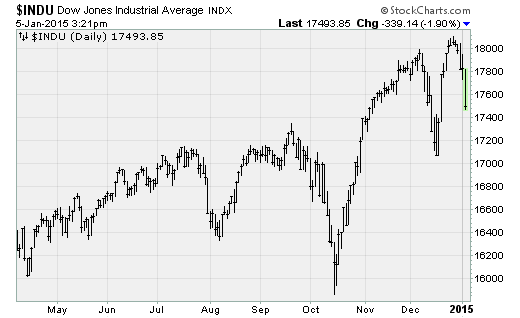Stocks start year with a selloff
Wall Street returned to work on Monday with a bad case of the post-holiday blues. Financial markets suffered their steepest losses since October, a performance that stands in stark contrast to the investor bullishness heading into the holidays.
The Dow Jones industrial average plunged 331 points, or 1.8 percent, to close 17,502, falling below the index's 50-day moving average. Overall, the Dow is down more than 3.3 percent from its recently set all-time-high of 18,103.
The Standard & Poor's 500 lost 38 points on the day, dipping to 2,020, and has fallen for four straight straight days for the first time since 2013. The Nasdaq composite index shed 74 points, or 1.6 percent, to 4,653.
Technically, a pullback was due after the Dow zoomed more than 1,000 points higher in the six sessions heading into Christmas Eve on light volume and narrow breadth. At the index's peak, just 62 percent of the stocks on the New York Stock Exchange were trending up, compared with nearly 75 percent in November and roughly 85 percent in July.
In other words, stocks were chugging higher on a narrowing base of support. And all of this was happening as the calendar prepared to flip into 2015, a year that many analysts think could prove treacherous for investors.
With memories of eggnog and family replaced by the chill of winter and the drudgery of morning commutes, two of these hurdles are weighing on the minds of investors: An ongoing collapse in crude oil prices, which fell below $50 a barrel on Monday for the first time since early 2009, and mounting concerns about the future of Greece and the fate of the eurozone.
Oil prices are testing near $49.77 as traders see "put" option contracts -- which are bets on falling prices -- increase in volume in the $40 to $50 level. Contracts down in the $20 to $30 barrel area are starting to trade, suggesting that investors expect oil prices to keep sliding.
Europe is also back in the news ahead of Greece's snap elections on January 25. Currently, the anti-austerity Syriza party maintains a lead in the polls, with a victory potentially undermining the calm that has prevailed in European financial markets since late 2012.
Rising political turmoil in the eurozone could slam the brakes on the European Central Bank launching a controversial bond buying program aimed at boosting growth in the region. Germany and the other creditor members of the eurozone have been resistant to such quantitative easing, fearful that their taxpayers will be at risk.
If there are doubts that Greece will honor its debt obligations, or fears that a Greek exit would immediately create problems for countries like Spain and Italy, it will be hard for the ECB to launch stimulus program. That, in turn, would undermine many of the assumptions investors have made regarding the value of European stocks and bonds, with negative repercussions for financial markets globally.

